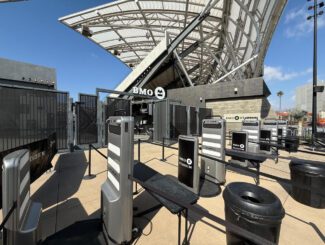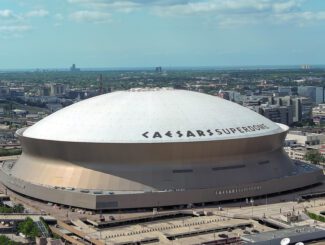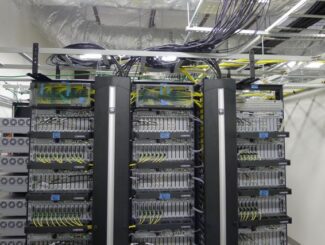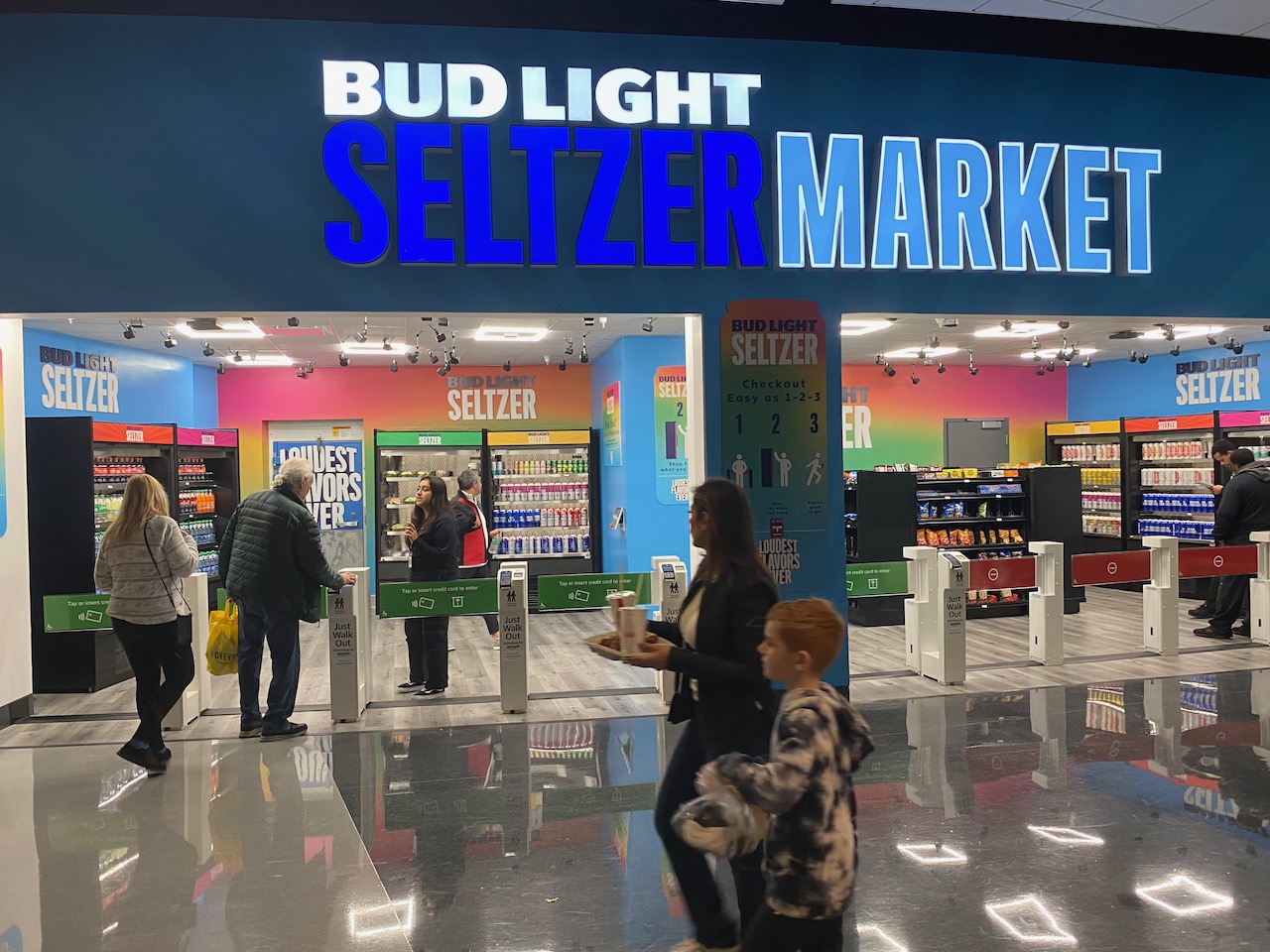
Amazon announced it has opened eight new “Just Walk Out” checkout-free concession stands at NBA arenas, including several stores deployed at arenas that previously only had checkout-free stands using technology from Zippin.
At Gainbridge Fieldhouse, home of the NBA’s Indianapolis Pacers, two new Amazon Just Walk Out stores have replaced four previous checkout-free stores that used technology from Zippin, a San Francisco-based startup that until this week had held the market lead for most stadium-specific checkout-free stores. But with Amazon now apparently pursuing its competitors’ customers with some vigor, the position at the top of the market has changed.
With its launch that also included two new Just Walk Out stores at the Spectrum Center in Charlotte, N.C., two new stores at the Crypto.com Arena in Los Angeles, and one store each at Scotiabank Arena in Toronto and Paycom Center in Oklahoma City, Amazon now has 97 stadium-specific Just Walk Out stores by our unofficial market count. Zippin, which also recently closed one store at the Spectrum Center, now has 87 stadium-specific checkout-free stores, including two new stores at the Frost Bank Center in San Antonio. Amazon also has six RFID-based stadium merchandise stores, which use different technology for checkout than its Just Walk Out store model.
Amazon stepping up its pursuit of stadium stores
Amazon, which earlier this year suffered a damaging blow to its checkout-free reputation when it decided to pull the Just Walk Out technology from its bigger grocery stores, has clearly stepped up its pursuit of stadium-based stores this summer and fall. In September, the retail behemoth announced it had added 13 new Just Walk Out stores at NFL stadiums, including five new stores at Lumen Field in Seattle, making that venue the place with the most checkout-free stores in a single stadium, with 13. Allegiant Stadium in Las Vegas previously had the most checkout-free stores, with 10 Zippin stands.
But what made those NFL Amazon additions different from the most recent NBA ones is that they came at stadiums that either previously only had Amazon stores, or had no checkout-free stores. The new store additions in previous Zippin territory — especially at Gainbridge, where Zippin said the Pacers decided not to keep the other two of the four previous Zippin stores open — seem to signal a much more competitive approach from Amazon, whose financial resources dwarf the other two companies in the space, Zippin and another startup called AiFi. Three of the other new Amazon stores, two stores at Spectrum Center and one at Paycom Center, are at venues that still currently have Zippin stores as well (two at Paycom Center and one at Spectrum Center).
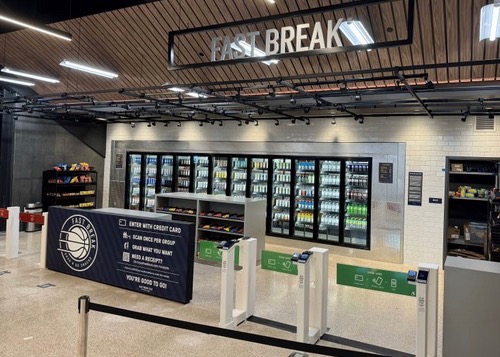
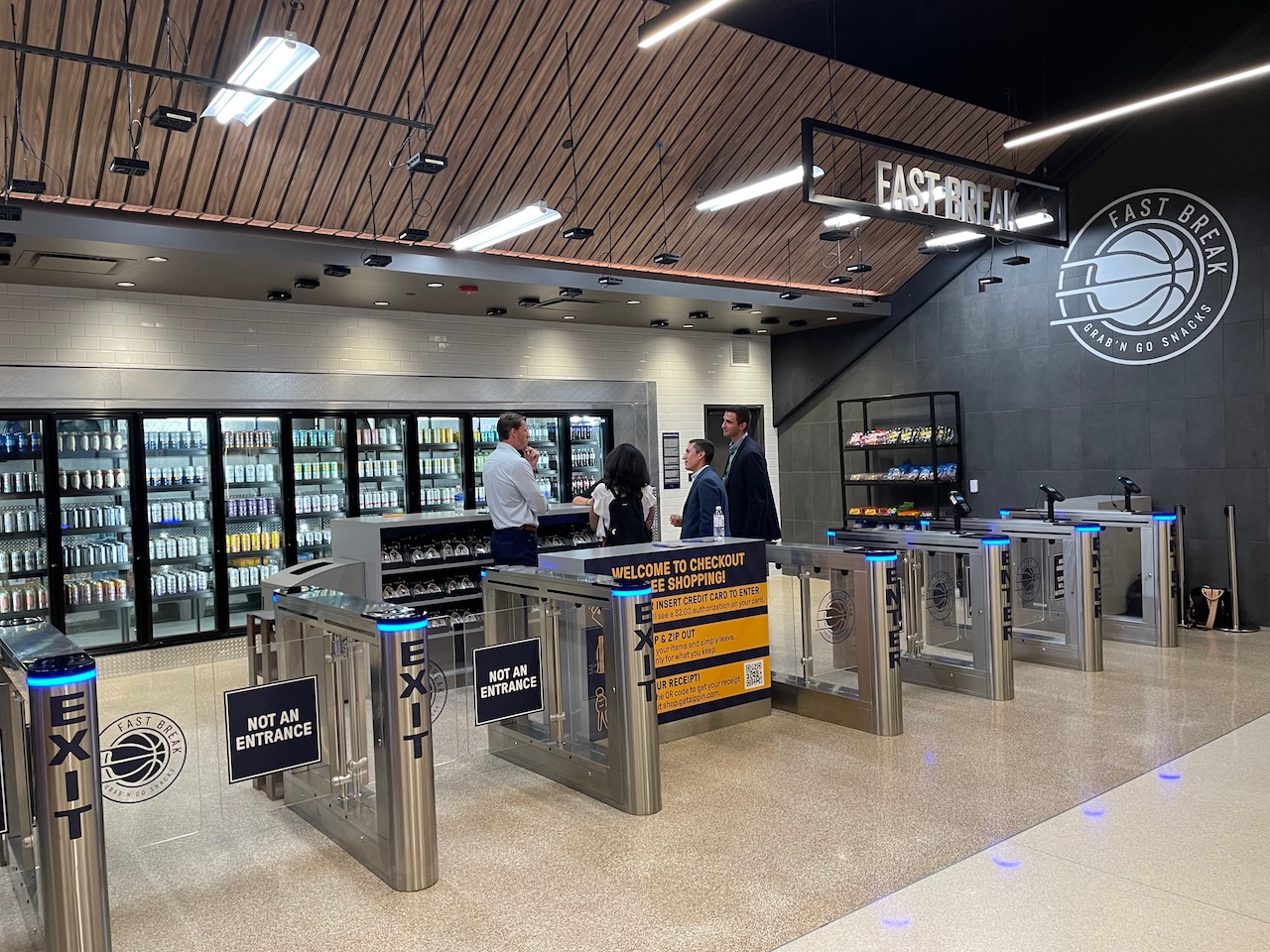
Since we don’t have many details of the new Amazon deals other than the announcement — both Amazon and caterer Levy Restaurants declined to respond to our requests to interview executives — we don’t know why the teams or the caterers decided to change or add another checkout-free technology player to their concessions mix. While there are a small number of existing stadiums that have checkout-free technology from more than one provider (Geha Field at Arrowhead Stadium, for example, has stores using technology from both Zippin and AiFi), in general most venues have stuck with a single provider in the still-nascent market.
Is market pressure hitting stadium-based checkout-free?
While the bull market for stadium-based checkout-free concession stands has stayed relatively equal over the past year when compared to the breakthrough year before, a huge chunk of this past year’s overall market growth (more than 100 stores launched in the last 12 months) was due to the debut of the Los Angeles Clippers’ new home the Intuit Dome, which reportedly has “40-plus” Ai-Fi-powered concession stands. (Intuit Dome, the Clippers and AiFi have not confirmed exactly how many stands are actually currently open at the new venue.)
And in an opposite twist to the new stores announced by the market-leading trio, the overall market for checkout-free technology has taken a couple big hits this year, with the decision by Standard AI to get out of the store business earlier this year and with the recent closing of another checkout-free technology provider, Grabango, which had focused on convenience stores. With both Standard AI and Grabango failing after taking big chunks of venture finance (reportedly $260 million for Standard AI and $93 million for Grabango), it’s possible that the market for venture capital in this space is getting squeezed, which could possibly put more pressure on the two startups, AiFi and Zippin.
AiFi, which by our unofficial count now has approximately 68 stadium-specific stores open (assuming Intuit Dome has at least 40 open), is also expanding its marketing strategies and tactics. One new thrust is AiFi calling its camera-based technology “spatial intelligence” that can help retailers in ways other than just being part of a checkout-free store. (This direction is similar to the services “pivot” that Standard AI is trying to pull off.)
In a company blog post outlining the Spatial Intelligence theme, AiFi CEO Steve Carlin took several swipes at Amazon, painting its Just Walk Out systems as more costly in part due to Amazon’s reliance on shelf sensors for identifying checkout-free product selections. (Both Amazon and Zippin use sensors in some store deployments alongside cameras, while AiFi only uses cameras. Read our previous market report for more technical details on how checkout-free stores work.)
The real question for all involved is whether or not Amazon is now using its financial might to sign less-costly deals in order to gain market share, and perhaps targeting places where it could hurt competitors the most. Jon Jenkins, vice president of Just Walk Out for Amazon, told our podcast audience earlier this year that Amazon can “definitely nail that value proposition” for checkout-free, and that he sees Just Walk Out expanding beyond stadiums to other time-sensitive verticals like airports and campuses in the near future.
Zippin, which may now be feeling the heat of previously being the top-of-market target, isn’t sitting still either. The company recently announced a deal to integrate Yellow Dog Software’s back-office and inventory management tools with Zippin’s checkout-free technology, to give store operators more efficient and comprehensive views of inventory and store performance.
While he was “disappointed” in the decision by the Pacers to switch checkout-free providers, Zippin CEO Krishna Motukuri told Stadium Tech Report he’s optimistic on Zippin’s prospects and the stadium checkout-free market going forward.
Motukuri said that technology advancements now allow Zippin to be able to deploy one of their lower-cost stores in one day, and said the company has been spending time with more software integrations like the Yellow Dog deal that allow Zippin stores to more easily add team loyalty and promotion information directly into the Zippin billing infrastructure.
“By the time the economy picked up this year, a lot of NFL teams were already done with their decisions,” Motukuri said. “I’m bullish on next year.”




